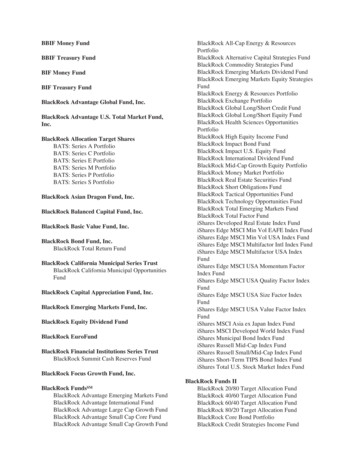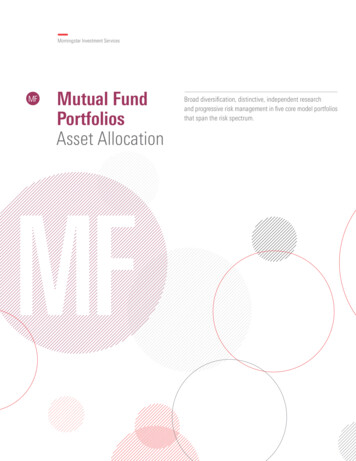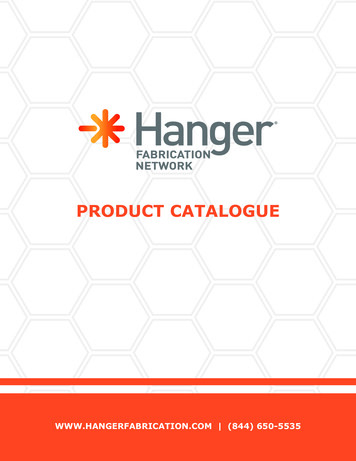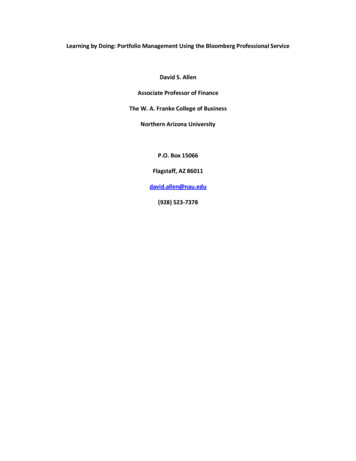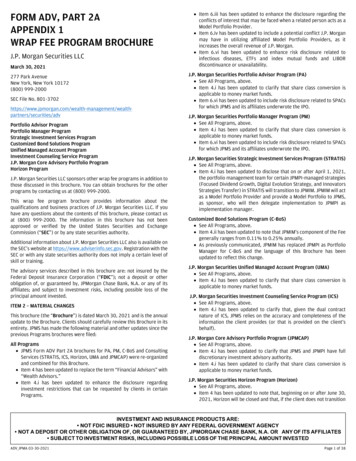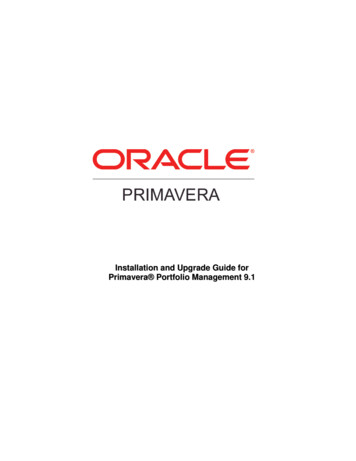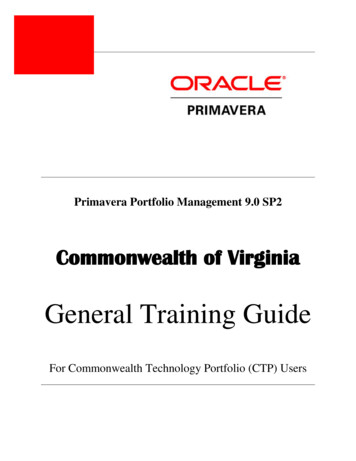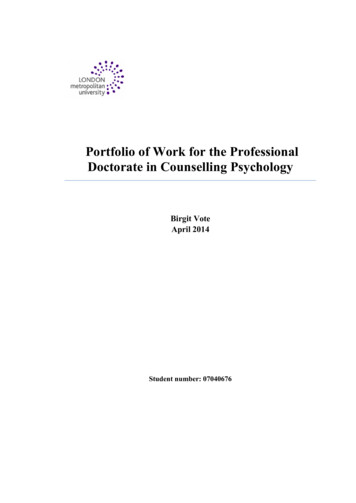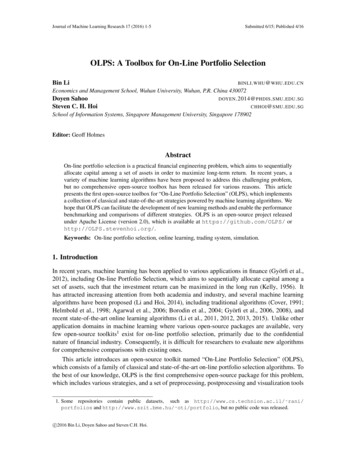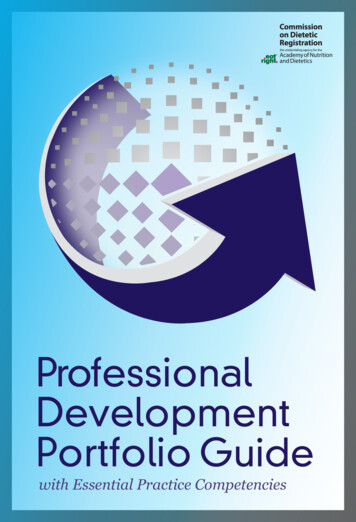
Transcription
ProfessionalDevelopmentPortfolio Guidewith Essential Practice Competencies
ProfessionalDevelopmentPortfoliowith Essential Practice CompetenciesWelcome to the CDRProfessional DevelopmentPortfolio Guide!A brief overview of the processThis booklet, known as the PDP Guide, will help you navigate the 3 steps of yourCDR recertification process, whether this is your first cycle or even your fourth.In short, the PDP process is aimed at helping to enrich your continuing educationexperience. This is achieved by emphasizing assessment of your current role, goalsetting, and reflection on the impact of the activities you complete.1The first step is your Learning Plan, where you’ll take the long view onthe coming 5-year cycle to better direct your education. You’ll developthis plan using our new intelligent Goal Wizard tool.2Once you’ve created your Learning Plan, you will record continuingeducation activities you've attended in the Activity Log. When you'vecompleted your minimum CPE requirements, you will submit the Log toCDR for review.3At the end of your 5-year cycle there is one final step, though not oneyou'll submit to CDR. The Professional Development Assessment is anexercise to measure the efficacy of your planning and prepare you foryour next cycle.It’s really pretty simple, but it is important to note that as this is a professionalrecertification there are rules that will need to be followed in order to be successful.These are outlined in detail within each section of the PDP Guide, so be sure to readthis document thoroughly to avoid any issues.Finally, the majority of the PDP process occurs in the MyCDR section of the CDRwebsite, cdrnet.org, so before starting anything it would be a good idea to log in andbecome familiar with the features there.
ProfessionalDevelopmentPortfoliowith Essential Practice CompetenciesDear Dietetics and Nutrition Practitioner:The Commission on Dietetic Registration (CDR), the credentialing agency for the Academyof Nutrition and Dietetics, is committed to protecting the public through the enforcementof validated certification standards and the Code of Ethics for the Profession of e-of-ethics). In addition to rigorouscredentialing processes, the Commission is also dedicated to meeting the needs of nutritionand dietetics practitioners with practical resources to enhance continual professionallearning and growth.The Professional Development Portfolio Guide now reflects Essential Practice Competenciesfor CDR Credentialed Nutrition and Dietetics Practitioners. As a shift from the traditionalPDP learning need codes, practice competencies describe the knowledge, skills, judgment,and attitudes for all credentialed practitioners throughout their careers, and across areasof practice, and work settings.To assist with the PDP transition to practice competencies, the Goal Wizard, an online,interactive tool is available by logging into your “MyCDR” page on the CDR website(www.cdrnet.org). The Goal Wizard asks a series of structured questions based uponpractice status, daily professional activities, and current and future learning needs, inorder to assist you in formulating and submitting your individual learning plan. The GoalWizard promotes professional self-reflection and learning needs assessment to help youcomplete your learning plan by selecting competencies and performance indicators fromyour personalized Practice Competency Profile.The essential practice competencies and Goal Wizard have been incorporated into the PDPprocess beginning June 2, 2015, for newly credentialed nutrition and dietetics practitioners,and June 1, 2016, for recertifying credentialed nutrition and dietetics practitioners completingthe 2016-2021 recertification cycle. All other practitioners will be transitioned into the newsystem over the next five years.These enhancements to the PDP process are exciting and also meet the needs of nutritionand dietetics practitioners who are fully engaged in quality career-long learning andprofessional growth. Please visit cdrnet.org/competencies for helpful resources aboutthe competency-based PDP process. If you have any questions, email CDR at cdr@eatright.org or at competencies@eatright.org, or phone CDR at 800/877-1600 ext. 5500.Sincerely,Kevin Sauer, PhD, RD, LDChairCommission on Dietetic Registration
1Table of ContentsProfessional Development Portfolio GuideProfessional Development Portfolio At A Glance.2Continuing Professional Education Activity Types.15Professional Development Portfolio Principles.4Step 1: Learning Plan Using The Goal Wizard Tool.8Step 2: Activity Log.11Step 3: Professional Development Evaluation.14Continuing Professional Education Activity Types.15Portfolio Audit Procedures.27Definitions Of Terms.28AppendicesPlease Note: All appendices are contained in the separate PDP Appendix PDFto be found elsewhere on the CDR website.A: Instructions for Online Entry of Learning Plan/Activity Log 2B: Sponsored Independent Learning Contract.11C: Approved Certification Program Information.13D: Resources for PDP Process Development.17E: Visioning Report and Workforce Demand Study. 19F: Independent Foreign Degree Evaluation Agencies. 21Contacting CDRThe Commission on Dietetic Registration will always be the best resourcefor information regarding the PDP process and its requirements. Feel free tocontact us in one of the following manners:Phone: 1-800-877-1600 x 5500Web: www.cdrnet.orgEmail: cdr@eatright.orgFax: 312-899-4772Mail: Commission on Dietetic Registration120 South Riverside Plaza, Suite 2190Chicago, IL 60606-69951
2Professional DevelopmentPortfolio PrinciplesTaking a hands on approach toyour continuing educationThe underlying principle of the ProfessionalDevelopment Portfolio (PDP) process is thateffective continuing professional education(CPE) involves more than informationtransfer alone. Research shows CPE isoptimized when each practitioner identifiesknowledge and skills needed for professionalcompetence, uses appropriate educationalmethods, and develops individualizedstrategies to implement what has beenlearned by applying it to professional practice.Bu i ld ing upon these pr inciples, theCommission on Dietetic Registration (CDR)constructed a PDP process, which promoteslifelong learning and continuing professionalcompetence while providing you withthe tools to achieve these aims. The toolswill enable you to analyze circumstances,requirements, and essential practicecompetencies within your profession; createand carry out an individualized continuingeducation activity; and evaluate the successof using CPE in your professional life.CDR embraces the Academy of Nutrition andDietetics’ Standards of Professional Practice,which hold the individual professionalresponsible for continuing competence.The Code of Ethics for the Profession ofDietetics, which applies to all registereddietitian nutritionists (RDNs), registereddietitians (RDs), nutrition and dieteticstechnicians, registered (NDTRs), and dietetictechnicians, registered (DTRs), also imposesan on-going obligation on these practitionersto maintain competence by increasingtheir professional knowledge and skills.The Code of Ethics specifically states that,“[t]he dietetics practitioner assumes a lifelong responsibility for personal competencein practice, consistent w ith acceptedprofessional standards, continually strivingto increase professional knowledge and skillsand to apply them in practice.” RDNs, RDs,NDTRs, and DTRs not complying with the Codeof Ethics are subject to disciplinary actions,including censure, probation, suspension ofregistration, and revocation of -ethics).To enhance accountability and assistpractitioners with achieving their goals,CDR will employ a periodic audit processwhereby it will randomly select practitionersand will require those individuals to submittheir CPE documentation. Only practitionerswho are audited will be required to submitCPE documentation. Specif ic “Aud itDocumentation To Retain” is outlined for eachdifferent activity type in the CPE Activitiessection of the guide (pages 16–27).The three steps of the PDP process take time.The value of the process is often proportionateto the effort expended in its completion.
3Essential PracticeCompetenciesInsight into CDR's latestrecertification initiativeThe Professional Development Portfolio nowfeatures Essential Practice Competencies,which prov ide overarching validatedstandards for CDR's core credentials: theRDN or RD, and the NDTR or DTR.Practice competencies define the knowledge,skill, judgment, and attitude requirementsthroughout a practitioner’s career, acrosspractice, and within focus areas. Competenciesprovide a structured guide to help identify,evaluate, and develop the behaviors requiredfor continuing competence.Unlike entry-level competencies, which focuson preparation and evaluation for minimumcompetence upon completion of an academicactivity approved by ACEND (AccreditationCouncil for Education in Nutrition andDietetics), the essential practice competenciesare intended for use throughout a nutritionand dietetics practitioner’s career.There is an expectation that competencieswill be used by the dietetics professional to identify learning needs; guide continuing professional developmentand ongoing competence; assist in career progression and professionaldevelopment, and, communicate the role and competenceof the profession to stakeholders (e.g.,employers, external accreditation bodies,the public, etc.).The competency-based PDP is intended toassist practitioners with increasing theirskills, knowledge, and competence whilealso ensuring compliance with the Code ofEthics. The PDP process does not, however,warrant or guarantee competency, accuracy,or any particular treatment result, butrather, participation in the process helpsdemonstrate the practitioner’s commitmentto providing the highest quality dieteticservices through continuous education andprofessional development.The first group to use the essential practicecompetencies in the PDP will be newRDNs or RDs and new NDTRs or DTRswho are credentialed June 2, 2015-May 31,2021 and practitioners recertifying June1, 2016-May 31, 2021. Annually thereafter,newly credentialed practitioners and thoserecertifying will begin including essentialpractice competencies in the PDP. The lastgroup to transition to essential practicecompetencies will be new RDNs or RDs, andNDTRs or DTRs credentialed June 2, 2019–May 31, 2025 and practitioners recertifyingJune 1, 2020–May 31, 2025.For complete information on the EssentialPractice Competencies initiative, visitcdrnet.org/competencies.
4Continuing ProfessionalEducation InformationCPE Definition and PhilosophyCPE, as defined in the CDR Dietetics PracticeAudit (see Appendix D), is education beyondthat required for entry into the profession.The dietetics professional participates inlifelong learning to maintain and improveknowledge and skills for competent practice.CPE is the implementation of the LearningPlan of the PDP process. CPE activitiesmust be selected based on your individualLearning Plan as developed using the GoalWizard tool.4.Are targeted academically to beyond entry-leveldietetics professionals and provide learningoutcomes that apply to professional practiceor intended practice.5.Are developed by instructors or individualswho have appropriate academic training,certification, or demonstrated expertise topresent or develop materials in a particularsubject area.6.Academic degrees should be relevant andfrom a US regionally accredited institution.Foreign academic degrees accredited by foreignequivalent institutions are accepted on thecondition that they have been verified by one ofthe agencies listed on the Independent ForeignDegree Evaluation Agencies list on pages21 and 22 of the Appendix. Publications inscientific, peer-reviewed professional journalsor presentations at scientific, peer-reviewedconferences may also be used to help establishexpertise.7.Demonstrate that content, quality, and scientificintegrity of the activities and materials aremaintained.8.Presentations and materials that are clinicalin nature are evidence-based. A balanceddiscussion of the topic, including risk versusbenefit information where appropriate, isensured. Controversial or disputed issuesare presented as such and supported bydocumentation from current and reputable,refereed, scientific journals.9.Disclose potentia l conf licts of interest,including commercial biasContent Criteria and RequirementsChecklist for Continuing ProfessionalEducation Activities That You Attend toMaintain RegistrationCPE encompasses activities or materials thatyou attend and that must have the followingcharacteristics:1.Facilitate lifelong learning by updating,enhancing, or assessing knowledge and skillsoutlined in the essential practice competencies2.Help you implement an individual LearningPlan3.Are dietetics relatedDietetics related means: The integration,appl ic at ion , a nd com mu n ic at ion ofprinciples derived from food, nutrition,social, business, and basic sciences to achieveand maintain optimal nutritional statusof individuals through the development,provision, and management of effective foodand nutrition services in a variety of settingsand as defined by the essential practicecompetencies.10. Are (typically) a minimum of one (1) contacthour in length.11. Exceptions include professional reading,poster presentations and exhibits, and selfstudy activities, which can be a minimum of0.5 CPEUs.
5You must complete CPE activities withinyour 5-year recertification period to beawarded CPEUs. Your Learning Plan mustbe submitted before you participate in CPEactivities or must be postmarked no laterthan 120 days after completing your first CPEactivity in your current recertification cycle.Only approved CPE Activity Types listed onpages 16–27 will be awarded CPEUs by CDR.RDNs or RDs must attain 75 CPEUs and NDTRSor DTRs must attain 50 CPEUs during a 5-yearreporting period. CPE activities must be basedon the individual learning needs specified onyour Learning Plan that has been approved byCDR. Some CPE activities have CPEU limitsfor a 5-year reporting period; any limits arelisted in the description of each specificCPE activity. The same learning activities,for example, completing the CPE activity indifferent editions of the same publication,should not be repeated in the same 5-yearrecertification cycle.Be aware that failure to complete the PDPprocess will lead to the loss of your RDN orRD, or NDTR or DTR credential.CDR will continue to process prior approvalof CPE and accreditation for CPE providersto identify activities and providers thathave met CDR standards. You may attendactivities that have not been prior-approvedor presented by CDR-accredited providers(except for self-study activities), on thecondition that they meet PDP processrequirements.The Online CPE Database can be found at:cdrnet.org/databaseA complete listing of CDR's AccreditedProviders can be found at the following linkcdrnet.org/providersThe Difference BetweenTeaching And LearningIn determining which CPE activ itiesreceive credit under the PDP process,CDR’s Competenc y A ssu ra nce Pa nelconsiders the direction of informationflow—whether it is toward or away from thepractitioner. For example, when attending alecture/seminar, information is flowing fromthe presenter and toward the practitioner;therefore, this activity could be eligible forCPE. When it is the practitioner deliveringa presentation, however, the information isflowing from the practitioner to the audience;therefore, being a presenter is not eligible forCPE. Presenters may possibly obtain CPEUsfor certain preparation activities within theapproved CPE categories. See pages 16–27for a full list of approved CPE activity types.
6Required Ethics CPE ActivityAll CDR credentialed practitioners mustcomplete a minimum of 1 CPEU pertainingto the topic of ethics during each 5-yearrecertification cycle.There is no one single activity that you mustcomplete to satisfy this requirement, as longas a continuing education program's contentis primarily about a matter of professionalethics and how it relates to your practice.This can be either a live or self-study activitythough one should be mindful that all selfstudy activities must be either: prior approved,offered by a CDR Accredited Provider, or haveapproval from a similar accrediting body, aslisted on page ##.Accordingly: Each Step 1: Learning Plan submittedfor will be required to include a practicecompetency and subsequent performanceindicator from Sphere 1: Ethics andProfessionalism (Competencies 1.1–1.6). Each Step 2: Activity Log submitted mustinclude at least 1 Continuing ProfessionalEducation Unit (CPEU) with a performanceindicator from an ethics-related practicecompetency goal (1.1.1–1.6.5).Visit cdrnet.org/ethics for an updated list ofresources to help complete this requirement.MyCDRGo Mobile AppOn-the-go credential managementRDNs or RDs, and NDTRs or DTRs, are now ableto utilize an internet-enabled smartphone tolog their CPEU activities immediately uponcompletion. Additional functions of the appinclude the ability to complete quizzes fromthe Journal of the Academy of Nutrition andDietetics, as well as updating one's profileand even paying the annual registrationmaintenance fee. Practitioners can downloadthe MyCDRGo app from either the Apple AppStore or the Google Play store, or by visitingthe following website from any smartphone:cdrnet.org/mycdrgo9:41 AM100%
7CPEU Head Start ProgramOne of the many benefits found insubmitting the Activity Log earlyFor practitioners who have completed theirrecertification requirements early, CDR has aprocess to allow CPE activities completed inthe final 75 days of one's 5-year cycle to nowbe posted toward the practitioner's coming5-year cycle.5.This head start program pertains exclusivelyto activities completed in the final 75 days ofa practitioner’s current recertification cycle,only when all of the following criteria havebeen met:6.1.2.3.4.Practitioners must have successfullycompleted the CPEUs required for theircurrent cycle (75 CPEUs for RDNs orRDs or 50 CPEUs for NDTRs or DTRs).Practitioners must submit theircompleted online Step 2: Activity Logfor the current cycle no later thanMarch 17 of the last year of theirrecertification cycle in order to beeligible for the CPEU Head Start.The CPEUs to be transferred must beattained during the last 75 days of thecurrent recertification cycle (i.e., CPEactivities must be completed betweenMarch 17 and May 31).The first CPEU to be transferred to thenext cycle must be attained at leastone day after the completion date ofthe last activity logged for the currentcycle ending May 31.7.RDNs or RDs may transfer up to 15CPEUs and NDTRs or DTRs maytransfer up to 10 CPEUs earned duringthe last 75 days of their recertificationcycle toward their next cycle, whichbegins June 1.A new Step 1: Learning Plan for thenew cycle beginning June 1 needs tobe submitted no later than 120 daysafter the completion date of the firstactivity to be transferred to the nextrecertification cycle.All CPEUs from a given activity must betransferred. CPEUs from one activitycannot be credited across multiplerecertification cycles.
8Continuing ProfessionalEducation Activity Types100. Academic CourseworkDietetics-related academic coursework, includingdistance learning, at a regionally accredited US college oruniversity can be awarded CPEUs based on the followinglist. Under the activity description in your Step 2: ActivityLog, indicate whether the coursework was taken duringa semester, trimester, or quarter. Academic courseworkthat qualifies for CPE credit must be started after youhave become an RDN or RD, or NDTR or DTR and mustbe completed in your current recertification cycle. Thedate of completion of academic coursework can be eitherthe date of notification of successful course completionor the date of the final examination required for coursecompletion; note, however, that the notification ofsuccessful completion of coursework must be receivedby May 31 of the last year of the recertification cycle.CPEUs Approved1 semester credit hour1 trimester credit hour1 quarter credit hourCourse takenfor CreditCourseAudited15 CPEUs14 CPEUs10 CPEUs8 CPEUs7 CPEUs5 CPEUs101. Massive Open Online Courses(U.S. Regionally Accredited Colleges orUniversities)Time spent viewing recorded online lectures or seminarsoffered via regionally accredited colleges or universitieswithin the context of massive online open courses(MOOCS) can be awarded CPEUs. You must have officialverification of your participation, such as a certificate ofcompletion that verifies that you have completed specifiedassignments, participatory activities, and evaluationbenchmarks.One CPEU is equivalent to 1 contact hour.Maximum CPEUs per 5 YearsNo MaximumDescription for Activity LogCourse TitleCollege or UniversityDate CompletedQuarter, Semester or TrimesterCredits Earned/CPEUs RequestedAudit Documentation to RetainOfficial TranscriptMaximum CPEUs per 5 YearsNo MaximumDescription for Activity LogCourse TitleCollege or UniversityDate CompletedAudit Documentation to RetainOfficial Verification of Participation
9CPE Activity Type Information110. Case PresentationsCPEUs may be awarded for attendance at dietetics-relatedcase presentations. Examples may include but are notlimited to:—Grand rounds—Patient case studyOne CPEU is equivalent to 1 contact hour.120. Certificate ProgramsAn intensive training program with a performanceassessment component. Upon completion of theprogram, participants receive a certificate attesting tothe attainment of a new knowledge/skill set (e.g., CDR’sCertificate of Training in Weight Management). Unlike acertification, participants do not receive a professionaldesignation (e.g.,CSSD). Certificate programs must:1.Be dietetics-related.2.Have stated learning objectives upon which the course andassessment content is based.3.Include content expert instruction and interactive discussion(which may occur face-to-face or by electronic delivery).4.Include a post-course assessment that assesses theparticipant’s completion of the program’s learning objectives.5.Have all course materials reviewed by a minimum of threeprofessionals with demonstrated expertise in the content areaattesting to the hours needed to complete the program.6.Be sponsored by the Commission on Dietetic Registration(CDR) or a CDR-accredited provider.If the program includes a self-study component, theself-study must include an assessment based on statedlearning objectives wherein course participants mustpass the assessment to continue in the program and toreceive CPEUs for the self-study component.Individuals completing a certificate program receiveCPEUs for training and assessment time regardless ofwhether they pass the post-course assessment and receivethe certificate.Though you may receive certificates of completions forlectures and seminars as well as for self-study activities,these certificates do not signify completion of 120-levelcertificate programs.One CPEU is equivalent to 1 contact hour.Maximum CPEUs per 5 YearsNo MaximumDescription for Activity LogProgram Title, Provider, DateCompleted, CPEUs RequestedAudit Documentation to RetainCertificate of Completionor agenda/timing outlineProvider Contact InformationMaximum CPEUs per 5 YearsNo MaximumDescription for Activity LogProgram Title, Provider, DateCompleted, CPEUs RequestedAudit Documentation to RetainCertificate of Completionor agenda/timing outlineProvider Contact Information
10CPE Activity Type Information130. ExhibitsLearning obtained from dietetics-related exhibits such asthose presented at the Academy of Nutrition and DieteticsFood and Nutrition Conference and Expo can be awardedCPEUs when properly documented.Maximum CPEUs per 5 YearsYou do not need to list exhibitors separately. You mayrecord several exhibits that relate to the same learningneed code as one event on your Step 2: Activity Log.Event, Provider, Date Completed,CPEUs RequestedVirtual, online exhibits may be awarded up to 1 CPEU,provided the exhibit is organized around a single,dietetics-related topic; provides a certificate of completionfor participants; and contains a minimum of 25 links orpages of text for review.15 for RDNs or RDs,10 for NDTRs or DTRsDescription for Activity LogAudit Documentation to RetainCertificate of Attendance/CompletionorMaterials Describing Exhibits(Date, Timeline, Provider, Content)One-half (0.5) CPEU is equivalent to a one-half contacthour (30 minutes).140. Experiential Skill DevelopmentGuidelines for experiential skill development activitiesare:—Content must be dietetics-related—Program must include a didactic component—Providers must be credentialed professionals in the subjectarea taught or must be an RDN or RD, or NDTR or DTR (forculinary programs, an RDN or RD, or NDTR or DTR must beinvolved in the planning or presentation)Examples of experiential skill development activitiesinclude culinary skills training (content must focus onfood composition, food chemistry, alternative nutrientsources, cultural/social/economic influences, techniquesto improve acceptability or compliance), physicalassessment training, multi-skills training, and computer/technology training. Any self-study experiential skilldevelopment activity must meet requirements listed inthe 700-740 Preapproved Self-Study section.One CPEU is equivalent to 1 contact hour.150. Interactive WorkshopsWorkshop content is required to be dietetics related, andthe workshop should include interactive discussion orparticipation among attendees.One CPEU is equivalent to 1 contact hour.Maximum CPEUs per 5 YearsNo MaximumDescription for Activity LogProgram Title, Provider, DateCompleted, CPEUs RequestedAudit Documentation to RetainCertificate of Completionor agenda/timing outlineProvider Contact InformationMaximum CPEUs per 5 YearsNo MaximumDescription for Activity LogProgram Title, Provider, DateCompleted, CPEUs RequestedAudit Documentation to RetainCertificate of Completionor agenda/timing outlineProvider Contact Information
11CPE Activity Type Information160. Journal ClubsThe journal club must be preplanned, provide for groupparticipation, include three or more professionals andinclude in-depth discussion of a single dietetics-relatedtopic from pre-assigned articles/papers in professional,peer-reviewed journals (materials should not be olderthan five years). Online journal clubs, in which interactiveposts by dietetics professionals are read by and respondedto by dietetics professionals, are also creditable. A systemor program administrator should be able to provideverification of participation in the event of an audit.One CPEU is equivalent to 1 contact hour.Maximum CPEUs per 5 YearsNo MaximumDescription for Activity LogProgram Title(including topic or article),Provider (hosting organization),Date Completed, CPEUs RequestedAudit Documentation to RetainCertificate of Completionor agenda/timing outlineProvider Contact Information170. Live Lectures/Seminars171. Webinars/TeleseminarsLecture/seminar content must be dietetics related andinclude participation by or discussion among attendees.Web or telephone conference seminars must occur inreal time and include a provision for discussion andinteraction between the presenter and attendees.Maximum CPEUs per 5 YearsYou may be requested to provide an itemized list oflectures attended at annual meetings or conferences.Audit Documentation to RetainNote that recorded webinars do not qualify under thisactivity type (see 175. Recorded Preapproved CPE, 230.Study Groups, and 700-740. Preapproved Self-Study).No MaximumDescription for Activity LogProgram Title, Provider, DateCompleted, CPEUs RequestedCertificate of Completionor agenda/timing outlineProvider Contact InformationOne CPEU is equivalent to 1 contact hour.175. Recorded Pre-Approved CPEViewing or listening to a recording of a presentation cannow be awarded CPE credit. In order for a recording tobe eligible for credit, the recorded presentation must havebeen either preapproved by CDR for credit when it waspresented live or offered by one of CDR’s accredited CPEproviders. In addition, the recording must be listenedto/viewed within 3 years of the original date of the livepresentation (e.g., a recording of a presentation given onSeptember 15, 2016, could be viewed for credit throughSeptember 14, 2019.) Please note that if the activityincluded a post-test/ quiz please see the description ofSelf-Study Activities (700-740).One CPEU is equivalent to 1 contact hour.Maximum CPEUs per 5 Years30 for RDNs or RDs,20 for NDTRs or DTRsDescription for Activity LogProgram Title, Provider, DateCompleted, CPEUs RequestedAudit Documentation to RetainCertificate of Completionor agenda/timing outlineProvider Contact Information
CPE Activity Type Information12180. PostersLearning through dietetics-related poster sessions,
with Essential Practice Competencies Dear Dietetics and Nutrition Practitioner: The Commission on Dietetic Registration (CDR), the credentialing agency for the Academy of Nutrition and Dietetics, is committed to protecting the public through the enforcement of validated certification standar
